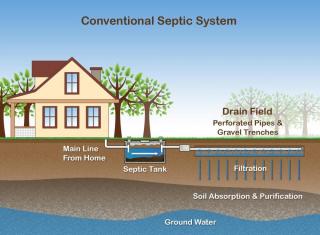Septic System Tips

Maintenance:
City ordinance requires each ISTS to be pumped every two years. Reminder postcards are mailed to homeowners a month before their pumping is due.
Use:
The amount of water entering the tank directly affects its ability to function properly. Overloading the system with too much water and putting harmful products into the system is asking for trouble. To work properly, your ISTS is dependent on millions of naturally-occurring bacteria from human wastes and materials typically found in wastewater. Your system will fail if used improperly.
Your on-site sewage treatment systems should operate for many years if you...
- Wash a few laundry loads over several days rather than a week’s wash all on one day.
- Install low-flow toilets and shower heads or install water-flow limiters on your shower heads.
- Repair leaky faucets and toilets.
- Never permit chlorine-treated water from swimming pools and hot tubs to enter your ISTS. Make every effort to have water used during water softener recharge diverted outside of the septic system.
- Do not use septic system additives or chemicals. These products will not cure problems nor are they necessary. Human waste supplies all of the biological action that is needed for your system to function properly. EPA or USDA approval of additives only means that the product contains no hazardous materials. It does not mean the product is effective or that it will perform as advertised.
Be certain you know the location of your drain field:
- Do not permit cars, trucks or construction/landscape equipment to drive or park over your septic tank or drain field.
- Do not place gardens, swing sets or sand boxes on your drain field or cover the area with an impermeable surface.
- Plant grass over the drain field, but do not fertilize the area.
- Do not plant trees or other plants with deep roots within five feet of the soil treatment area.
The following will overload your system, destroying its ability to process human waste, and cause it to fail:
- Do not put facial tissue, dental floss, paper towels, cigarette butts, coffee grounds, disposable diapers or personal hygiene products into your system.
- Do not use ‘every flush’ toilet bowl cleaners.
- Use the minimum amount of mild cleaners, soap, detergent and bleach necessary to do the job. Avoid frequent use of detergents with bleach additives.
- Limit the use of your garbage disposal. Vegetable, meat, fat, oil and other food products are difficult for bacteria to break down.
- Dispose of all solvents, paints, antifreeze and chemicals through local recycling and hazardous waster channels. Do not dump them down the drain.
- Do not put unwanted prescription or over-the-counter medications into the system.
- Use anti-bacterial and disinfectant products sparingly. Anti-bacterial hand soaps; tub and shower cleaners; drain and toilet bowl cleaners; laundry bleach and other anti-bacterial products destroy good bacteria in your septic system.

